|
In October, my husband and I welcomed a little boy. Our son is a master napper—and his favorite place to nap is most definitely in his parents’ arms. He has a way of passing out with his mouth wide open (a trait of my side of the family) and arms sort of flailed. Since he was born, and more recently, our 6-month-old has been teaching me about trust. When Benjamin is passed out in my arms and begins to stir in his sleep, he opens his mouth in a quivering “O” manner, as if to say, “Put my pacifier back in my mouth, please.” He does not open his eyes. He does not make a noise. It is a simple gesture. He has a desire for his pacifier to be back in his mouth, and trusts that I will, in fact, return the fallen pacifier. He trusts that he is loved, that he is provided for. He does not even need to wake up—he stays in a state of rest despite his request. This image of my son, asking to be cared for and trusting that I will fulfill his needs, makes me think of the prayer at the bottom of the Divine Mercy Image: Jesus I Trust in You. The message of Divine Mercy was given to St. Faustina, a Polish nun. Through revelation and prayer, Jesus communicated to St. Faustina the need for the whole world to understand His love and goodness as evidenced by one of his greatest attributes: mercy. This understanding begs us to trust that His mercies are bigger than our sin, and ultimately, that we are summoned to trust in the love and mercy that the Lord has for us. Jesus says to Faustina and she records in her diary, “‘I am love and Mercy Itself…The soul that trusts in My mercy is most fortunate, because I Myself take care of it.’” (1273) Benjamin’s trust in my love is the personification of belief in Divine Mercy. We are called to radically trust in Our Lord’s mercy and love in the same childlike way that Benjamin trusts me without any sign of doubt. The Divine Mercy message, to which the Church calls the faithful, is to accept our role as children—to have the faith that He will give us what we need. We too must trust in the goodness of Our Father to give us what we need. Is my trust as radical as my son’s? Am I able to completely rest knowing that our Lord desires to shower His grace and mercy upon me? Do I ask for His graces, trusting that He wants my good? On this Divine Mercy Sunday, ask yourself if you believe in the goodness of the Father. Ask for His grace for more trust in His mercy. Ask for more mercy! Reflect on the trust of children as they live in trust, knowing their parents will fulfill their every need. This Easter season, how can we become more childlike and embrace the message of Divine Mercy? Eternal God, in whom mercy is endless and the treasury of compassion — inexhaustible, look kindly upon us and increase Your mercy in us, that in difficult moments we might not despair nor become despondent, but with great confidence submit ourselves to Your holy will, which is Love and Mercy itself. -Closing prayer of the Divine Mercy Chaplet
0 Comments
The Gospel reading for the Fifth Sunday of Lent is the familiar passage of the adulterous woman and her accusers. For as long as I can remember, this story has been bittersweet: it involves targeted harassment and shame, but also redemption and conversion. At this point in Lent, I don’t think there is a more needed, or relatable, lesson for us to be reminded of and to work on accepting. So, we’re five weeks into our Lenten journey. We’ve been skipping meat on Fridays and trying to live without whatever convenience or vice we decided to give up or purge from ourselves. Maybe we’re praying a little more than we normally would or are setting aside a few minutes to read a daily reflection from those little black books left in the back of our churches. But even with all of these intentional and humbling acts and motivations, we often still feel unworthy or like we’re faltering. Because of this, it’s possible to say that we don’t even need the Pharisees to judge us and bring us for judgement before God – we’re doing it enough for ourselves. To overcome this, I want us to reflect on three things: personal attitude, an open heart, and recognizing what’s in front of us. I think sometimes we’re too hard on ourselves. We allow our own harsh judgements to replace the only one that truly matters: God’s. Our own personal attitude can prevent us from accepting and sharing in the love and grace of God if we constantly feel that we are unworthy or failing. In the Gospel, when the adulterous woman is brought before Jesus, it does not say that she cried or tried to run. In the Gospel account, she lays at the feet of Jesus, lets Him clear her name and, ultimately, lets Him forgive her sins. Here’s a secret I’ve learned that the Gospel has been trying to tell us for a few thousand years now: Man is never worthy on his own, but has been made so by Christ, who offers redemption to all. If man were worthy, Christ would not have needed to redeem us after the Fall. So, we need to stop allowing our own negative perception of our efforts to prevent us from bearing or receiving the fruits of God’s grace and forgiveness. Why was Jesus’ reaction effective with the woman? Christ did not condone her sin, but met the woman in her sinful situation with love and mercy. Surely, such a transformation is not possible without a profound encounter with God’s mercy, an openness to change, and conversion of heart. The adulterous woman of this week’s Gospel is told by Jesus to “Go, and from now on do not sin any more” (John 8:11). As a result of her encounter with Jesus, her heart was changed, and she spent the rest of her life trying to grow closer to Him. We are called to do the same – during the Lenten season or any other time. If we are open to the love of God, it will fill us and strengthen us in our actions. With a faithful attitude and a heart that is open to change, all that is left is for us to encounter God. In order to do this, we must recognize what is in front of us. In the challenges, relationships, beauty of nature, art, and moments of prayer, God is entirely present and inviting us to share in it with Him. What a beautiful gift, and how accessible and truly joyful this is for us! I want to suggest that each of us take a few moments each day this week to reflect on how we’ve gone out of ourselves to be with or grow closer to God. Instead of grumbling about how much we miss Netflix or those amazing chocolate caramels, be proud of yourself for being so committed to your solidarity with Christ and His own suffering. Or, if you tripped up, instead of getting frustrated with yourself, reflect on the three Stations of the Cross in which Jesus falls. Absolute perfection is never what God expects or even desires – He’s just pleased to recognize a desire in us to do better. For more resources to accompany you along your Lenten journey, please click here. Question for Reflection: How can you grow closer to God in the final days of the Lenten season? As I have gotten older, my favorite part about Lent has become the fact that we have the privilege of willingly walking into the desert - into these 40 days - with our Lord. I think there are a lot of times in our lives when we suddenly find ourselves in the desert - desperate for water, nourishment, or companionship. It is in the desert where we not only grow in intimacy with the Lord, but are also able to be strengthened through real repentance. What is true for us in the deserts of our lives is the same thing that was true for the Prodigal Son in this Sunday’s Gospel: we receive the promise of a Father who receives our repentance with mercy. The story of the Prodigal Son is an important one for us to reflect upon as we continue on our Lenten journeys - it is through repentance that the very son who squandered his inheritance is welcomed back with open arms into the mercy of his father. And the story doesn’t end there: not only does the father embrace and welcome his son back, he rejoices and celebrates his return for those around him to see. It is through our repentance that we experience the mercy of God; it is through our repentance that we receive the promise of the desert of these 40 days. This is so beautifully echoed in all the readings that the Church gives us during this season: God the Father rejoices when we are brought back to life again (Luke 15:32). We as Catholics have the unique privilege of receiving this mercy every time we hear the words of the priest absolving us in the Sacrament of Reconciliation. Our moments of feeling desperate in the desert can be alleviated by honest repentance. After one particularly frustrating time in my life, I remember feeling like the Prodigal Son: convicted that I needed to repent and return to God, but also feeling shame over all the ways that I had squandered what the Lord had given me. And in that moment a priest reminded me that confession is always a place of victory. Like the prodigal son who acknowledged his failures and was welcomed back with mercy and celebration, we too find an outpouring of mercy and grace when we reconcile ourselves to God. As we journey towards Calvary, we do so knowing that our repentance leads to an encounter of mercy and ultimately to victory. Questions for Reflection: What are some moments in your life when you’ve encountered the mercy of God and others? How did these moments affect you? For more resources to accompany you in your Lenten journey, please click here. The next forty days of Lent are Mother Church’s annual call to intense prayer, fasting, and almsgiving oriented towards embracing God as the center of one’s life and repenting of all which distracts us from Him. With the current crisis for the Church in the United States, it seems that the Church could really use a good spiritual renewal, cleansing, and renunciation of sin often focused on during the season of Lent. As parts of the Body of Christ[1], we are all too aware how an affliction experienced (or caused) by one part affects us all. Recall the words of St. Paul, “Rejoice with those who rejoice, weep with those who weep... Do not be conquered by evil but conquer evil with good.”[2] The Church is suffering but, just as she always has, she will ultimately be restored for the glory of God. As laity, you and I are key to addressing this scourge, along with the Church’s holy clergy and religious, and to affirming God’s presence in our lives not just in the Lenten season, but every day.
Though a time of repentance, Lent is not a time of despair or hopeless suffering; this season reminds us that God, although saddened by our repeated failings, never closes Himself off from offering mercy and love to the broken, the sinner, and the lost. Lent is not a diet, nor a fad of living without something trivial, nor even a temporary spiritual renewal; it must take root—free from the sin which prevents this—and be nourished over the coming weeks to strengthen us throughout the whole year. Above all, Lent prepares us for the celebration of Easter. Christ has died, Christ is risen, Christ will come again; the Church suffers, the Church is renewed, the Church shall be restored! The abuse scandal today may cause people to feel abandoned, angry, confused, and sad. “How can this be happening?” is certainly a question in our hearts and homes these days. It is important to remember that Jesus Christ, the same “yesterday, today, and forever,”[3] reigns over the Church. He is omnipotent, divinely good, and eternal; Let us take courage in the truth that our faith is ultimately in Jesus Christ. Because our Lord remains faithful to us[4] and ever close to His bride, the Church, He gives us the strength to recommit ourselves to renouncing the evil in our sight that threatens to drive us away from God and His Church. Lent is the perfect opportunity to facilitate spiritual renewal, not only for ourselves but also for the greater Church. Following the example of Jesus’ time in the desert before commencing His public ministry, the faithful are invited to reflect on the state of the Church, pray for strength, courage, justice, and healing, and even seek accountability in the governance of the Church. Personal penance can be made for our own failings, but reparation must also be made to address this scandal and to unify God’s people to prayerful and peaceful action in seeking God’s healing grace to move forward. Over the next 40 days, let us care for the Church by promoting healing among ourselves, supporting the afflicted and needy, addressing sin and divisions, and always proclaiming Christ to each other and the world. For more resources to accompany you throughout the Lenten season, please click here. [1] cf. Lumen Gentium, 33. [2] Romans 12:15, 21. [3] Hebrews 13:8. [4] cf. 2 Timothy 2:13. The authentic Christian life resounds with love. Beyond any fleeting attraction or fondness, this love is not meant to be hoarded, but to be given in charity and service to others. The love of a Christian reflects the love of God, without Whom we would not exist nor would we have the capacity to love beyond the other, lesser creatures of this planet. This love cannot be restricted to a single day on the calendar but is meant to flow freely every day at every hour through every difficulty and joy, every sorrow and labor, and every moment of pain and peace. It is love which motivates us not only to live for others, but always for the glory of God.
Normally, the marital love between a man and a woman manifests and literally takes on new life in the conception of a child. That child adds another wonderful dimension to the love of married life that encompasses parenthood. Years of teaching, correcting, protecting, caring for, playing with, cherishing, and feeding children are physical and emotional applications of love purposed with raising them as members of the domestic church. Eventually, the outpouring of parental love for children can be reciprocated by them in selfless acts of charity, gratitude, joy, or other expressions of affection. Think of the times your parents would beam at seeing your room tidy without asking, warmly embrace you, offer a surprise gift, or watch you shine at school or on the field. Similarly, the example of love shown between parents is not lost on children. This example imprints the strength of the sacrament of marriage—especially during times of difficulty or stress—and encourages children to better appreciate and actively participate in the love of family life. For example, chores or other labors may be done more freely as intrinsically valuable to the functioning of the domestic church; without love, children might only begrudgingly pick up after themselves when forced. How does love otherwise radiate through family life? The eyes which looked upon the spouse on the wedding day can continue to hold the same gaze of awe-filled love through later moments of despair or pain. The hands which exchanged wedding rings can embrace one another with tenderness, consolation, joy, or mercy. They can also be used in service to the poor, the lonely, or the dying. The lips which uttered sacred vows can impart wisdom, praise, blessings, or part in radiant smiles. Just as God lovingly created the human body down to the smallest detail as “good”, so too can the body we have been gifted be utilized to facilitate God’s love among loved ones and neighbors. Perhaps the first lesson your parents taught you was that God is love. By virtue of our baptism, we have become adopted sons and daughters of our Heavenly Father. As such, every answer to our prayers is entirely out of love, regardless of the result. Similarly, our parents, having been entrusted with caring for us, draw upon the love in their marriage to instruct, guide, nourish, or chastise. While our parents’ love may be imperfect, we can look upon the perfect example of the love of the Trinity to shape our applications of love to transcend human limitations. As St. Paul famously wrote, “love bears all things, believes all things, hopes all things, endures all things.” If it did not, how could any of us be forgiven for our sins against each other or God? How would salvation history exist without love? Authentic marriage or family life is not sustainable without love. And yet, our human limitations may restrict our application of love in certain circumstances. That is why love must be renewed. It must deepen over time to reflect the experiences of life and extend to others. Couples may go on date nights, retreats, vacations, or other activities which can foster relaxation and various communications of love. Similarly, we are reminded of God’s love at each Mass, in which recalling the ultimate Love on the cross helps us receive spiritual renewal to offer that same love to all we encounter. The spiritual renewal we attain allows us to recall the presence of God in our daily lives at every moment and to live up to the potential He calls us to. If our vocation is religious life, then we can hold steadfast to the rules of the order to which we belong and rejoice in our sacred calling. If we are single, we can allow ourselves to increase our capacity to love or extend it to others. If we are married, we can reaffirm the gifts of love in the family— raising children in the Faith or cherishing our spouse. In doing so, we realize that love does not come from ourselves. Rather, God, the source of all love, dwells in our hearts and provides the strength and courage to open ourselves in vulnerability to another. Our love may be spurned, mocked, or tested, but just as God will not refuse His infinite mercy to the hardest of sinners’ hearts, so too are we called to rise above human judgements or inclinations and extend to others the great gift of love God Himself never tires of bestowing. Question for Reflection: Who are some examples of authentic Christian love in your own life? For more resources on Marriage and Family, please click here. World Youth Day (WYD) is so much more than an international get-together with the pope. Too often, global experiences of faith get overlooked or underestimated; other times, since these gatherings have taken place now for four decades, they are simply taken for granted within the Church. But such oversight would be a missed opportunity for everyone in the Church and around the world. Why should we care? Three simple words: World. Youth. Day. Let me explain: World The first reason is that WYD is truly meant for the whole world. While young adults heading to Krakow in July are the primary protagonists of this particular international gathering, the message of WYD applies to everyone – everywhere. In fact, thanks in part to the growing accessibility of technology and social media, this pilgrimage is not limited to those who have the means to travel overseas. There are millions of young adult Catholics in the United States who can engage in WYD – through local stateside events in their parish, campus, or diocese, as well as through social media and digital communications. The U.S. bishops and pilgrim leaders in Krakow will be engaging directly with stateside and digital pilgrims this year so that those at home in the United States are as much a part of the pilgrimage as those who boarded a plane bound for Poland. No one is excluded – and that message is exactly what WYD offers the rest of the world. One of the frustrations many people experience during these international displays of faith is feeling left out, or feeling like they don’t matter. WYD is a chance for pilgrims to share in real time on social media a message of mercy and love that’s available to all. This message is meant not just for Catholics, Christians, or Krakow pilgrims; it is meant for the world. Youth There are many times when I get asked about “the kids” at WYD, and often, this feels like a dismissal – that this global experience is somehow just a “giant youth rally” not needing to be taken seriously. Such thinking is exactly why Pope St. John Paul II established the practice of WYDs: to remind the world that a gathering of young people is essential to the vibrancy of the Church and the transformation of the entire planet. Even more, there is a significant misconception about WHO this gathering is intended for. The name alone can be misleading. The “youth” in the WYD title is actually mistranslated in English. The target audiences for these international pilgrimages are “young adults.” That is, those in their late teens, twenties, and into their thirties. In 2016, the majority of U.S. pilgrims range from ages 18 to 30, and most diocesan groups are taking young men and women in their 20s and 30s, single and married. In other words, they aren’t “kids.” This news is actually incredibly refreshing, considering that young adults are one of the most disconnected groups of people from the Catholic Church and the practice of the faith. Around the United States, studies show that only 17% of millennial Catholics attend church weekly, and over one-third of young millennials have no religious affiliation whatsoever. To know that thousands of young adults from the U.S. are going to Krakow, and even more are engaging stateside or digitally, is one of the most important things that Catholics can celebrate this month. Let’s work to create local communities open to their enthusiasm so that returning pilgrims can engage in the life of the Church. Day It can be easy to dismiss WYD as a “Catholic Woodstock” – a one-time festival over the course of a few days when the pope and millions of young people gather together in a large open field to pray and talk about God. But again, there is so much more. WYD is not a “day” at all – but a pilgrimage. It includes months or years of spiritual and practical preparation, leading into years of follow-up work: putting into practice the message of WYD and the lessons learned along the way. One could compare this experience to a mountaintop journey. The events in Krakow or stateside are just the peak. And mountains are more than their highest summits. Too often, especially in the twenty-first century, we jump from one major task to the next, hardly stopping to slow down. Sometimes WYD is reduced to another task or event in a long line of trips, events, or papal visits. Many WYD pilgrims know that the journey is so much more than that. For some, WYD inspired them to their life’s calling: to marriage, to religious life or to the priesthood, to their careers, or to simply being an active adult Catholic. WYD is a catalyst for great things yet to come. This is just one reason why I encourage people to pay attention to WYD and what might emerge from the pilgrims who return home, and who will rise to the occasion. In a world torn apart by violence, polarization, and fear, let us heed the value of a lifelong pilgrimage: a process of accompaniment that requires time, patience, compassionate listening, and understanding – things often lacking in our world today. It can be tempting to excuse ourselves from caring about or thinking about WYD, dismissing it for one reason or another. Yet this is a moment of grace for everyone – from the pilgrims to the rest of the world. For one week, the Church turns its attention to this special encounter. Let’s not let this moment pass us by or excuse ourselves from paying attention. The world, especially in uncertain times and the face of tragedy and unrest, is in need of the graces that can come from WYD. It is meant for the world. It can be a mountaintop of the Catholic young adult experience. Let us pray that the end results can help heal, transform, and bring mercy and compassion into a world torn apart and hurting. To learn more about World Youth Day, please click here. *This post was originally published for our World Youth Day series on July 20, 2016
Near the persevered room of St. Vincent Pallotti in the Generalate of the Society of the Catholic Apostolate (Pallottine Fathers and Brothers) in Rome is a small museum. It contains many personal items of Pallotti. Most are very mundane – his umbrella, hat, shoes, habit, chalice and paten, but in a small glass case there are some things that are unique. Among them is a container with small slips of paper and pieces of wax (see the video “What is a Saint?” for more on that) and a notebook with mathematical formulae and assorted notes. Looking more closely, one can see that it is differential calculus. Pallotti was pondering the concept of infinity. He was using mathematics in his ongoing search for God.
Pallotti experienced God as “infinite” and “incomprehensible,” and yet also as “infinite love and mercy.” His intimate experience of God caused him to modify the Ignatian motto of Ad Majorem Dei Gloriam (For the Greater Glory of God) to Ad Infinitam Dei Gloriam (For the Infinite Glory of God). Pallotti desired that all experience God as Infinite Love which is why he created the Union of Catholic Apostolate, an association of lay people, clergy, and religious, to assist the missionary efforts of the Church, revive the faith of Catholics, and engage in works of universal charity. Through word and deed, members of the Union could then be witnesses of God who is Infinite Love. As we celebrate today the feast day of St. Vincent Pallotti, may we be inspired by his life to be bearers of God’s Infinite Love to all those we encounter. May the Charity of Christ urge us on! To learn more about St. Vincent Pallotti, please click here. In the most beautiful chapter of the best work of one of the greatest Catholic theologians - in my opinion, anyway - Saint Augustine tells the story of his mother, Saint Monica.
Saint Monica was born to a good Christian family but she had little luck in marriage. She was married at a young age to a man named Patricius, and they had three children together. He was a pagan, he was angry, and he was unfaithful. But Monica was patient and merciful. Despite Patricius’s evil ways, she served him with devotion, mercy, and constant prayer. At the end of his life, only one year before he died, her daily prayer and kindness were rewarded and Patricius was baptized into the faith. But Patricius’s conversion did not end Monica’s sorrow. Augustine was seventeen when Patricius died, and his conduct was worse than his father's. He was brilliant, but lazy. He drank excessively, stole, and lived promiscuously. The year his father died, Augustine fathered a son of his own out of wedlock. Despite Monica’s urging, Augustine refused to settle down and get married. Worse still, Augustine rejected his mother’s faith and joined the Manichean cult. But Monica never ceased her kindness and prayers. She followed Augustine as his teaching lead him to Carthage, to Rome, and to Milan. In Milan, Monica met Saint Ambrose, then a bishop. In serving in his church, she came to know Ambrose well, and Ambrose came to understand her sorrow for her son. He comforted her, saying, “Surely the son of so many tears will not perish.” Her prayers were eventually answered. A year before she died, Augustine was baptized. He went on to become one of greatest saints in history. As she lay dying, Monica told her son that her life’s work was complete. “One thing there was, for which I desired to linger a little while in this life, that I might see you a Catholic Christian before I died. God has granted this to me in more than abundance, for I see you his servant, with even earthly happiness held in contempt. What am I doing here?” (pg 223). Saint Monica gives us a powerful example of the influence of intercessory prayer (CCC 2634-2636). Monica did not use words to persuade Augustine to convert. Instead she led by example, living with kindness and praying on his behalf. For thirty-two years she patiently prayed for his conversion, and God rewarded his faithful servant. We are called to do the same. The Letter of James says, “Pray for one another, that you may be healed. The fervent prayer of a righteous person is very powerful” (James 5:16) and Jesus tells us, “Amen, amen, I say to you, whatever you ask the Father in my name he will give you.” (John 16:23). We are all sinners and we all need God’s intercession. But we are not alone. God desires us to pray for our own forgiveness and for the forgiveness of others. That is why we pray “forgive us our trespasses” and not “forgive me my trespasses.” People are difficult. We treat each other with anger, unfaithfulness, and unrepentance. But rather than meet those that harm us with our own shortcomings, let us instead follow Saint Monica’s example and live a life full of kindness and prayer. Pray for God’s help, pray for the forgiveness and conversion of others, and Saint Monica, pray for us. St. Monica’s feast day is celebrated on Monday, August 27, 2018. The call to evangelize is at the heart of our Christian faith. We are evangelizers at our core; it makes up our very identity. And yet, if I were to ask most people sitting in the church pews at Mass if they are evangelists, they would probably shake their heads and identify themselves in other terms: vocation, occupation, role in the family, country of origin. A professor of mine in graduate school put it starkly when he said most of the laity are experiencing an “identity crisis.” We do not know, or have forgotten, who we are as members of the Body of Christ and what our role is within it. Today, Pope Francis echoes his predecessors in reminding the laity of their call to become missionary disciples. This is a call that originates from God Himself, with the Risen Christ saying to his beloved disciples before ascending to the Father, “Go and make disciples of all nations.” These words reverberate ever more powerfully for us today. Though the universal call to holiness and a greater emphasis on evangelization has roots in the papacy of Pope Paul VI and within the Second Vatican Council, Pope Francis calls the concept of sharing our encounter with Jesus Christ using the means available to us “missionary discipleship.” It is a profound concept that Pope Francis assures us is relatively simple. “The new evangelization calls for personal involvement on the part of each of the baptized,” he writes in Evangelii Gaudium. “Every Christian is challenged, here and now, to be actively engaged in evangelization; indeed, anyone who has truly experienced God’s saving love does not need much time or lengthy training to go out and proclaim that love.” Once we have encountered Jesus Christ and His merciful love, we are called to bring that encounter to others, therefore playing a unique role in salvation history. Several of my colleagues from the Catholic Apostolate Center and I were honored to discuss “The Call to Missionary Discipleship” at the Catechetical Day hosted by the Archdiocese of Washington in late October. We discussed that, as baptized Christians, we have been given the grace of Jesus Christ in order to respond to the both daunting and exhilarating call to “go out to all the nations.” This understanding of evangelization subsists not only on our personal encounter with God’s transforming love, but also on our proclamation of it. It is not enough to encounter Jesus Christ for ourselves. Like the woman at the well, we must go forth telling anyone who will listen, “Come see a man who told me everything I have done.” Below are five practical tips we came up with for living out the call to be a missionary disciple. What are we missing? Feel free to add to our list by commenting on our post below! 1. Collaboration If we are to be missionary disciples, we must be people of collaboration. This does not mean that we attend endless meetings, join committees, or fill every moment of our schedule. We propose collaboration from the beginning, which means a willingness to begin an endeavor communally with others—recognizing the valuable role each person has. Collaboration must happen among, for, and with those in our parishes and organizations. It requires openness to the promptings of the Holy Spirit, humility, dialogue, and flexibility. How can you learn from others in your community, parish, family, workplace, or neighborhood? How might God use the gifts and talents of a diverse group of people to strengthen His kingdom on earth? 2. Technology As followers of Jesus Christ, we are called to use the tools of this present age in order to re-present the Gospel to our world in a way that is innovative and re-invigorated. A major tool today that can be used to spread the Gospel message is technology, especially the internet. We can share digital content that is valuable, such as Scripture, the Catechism, and Papal and Conciliar documents, in order to become better informed about our faith. Technology can also create a new type of community, enabling us to connect with others and share information in a way that is cost-effective and not limited to physical proximity. What are some ways you can use technology to spread the Gospel and help build a civilization of love? 3. Community/Parish Life We do not exist in isolation. As Christians, our work of evangelization will not bear much fruit if we do it alone. Our community, especially our parish, strengthens us and equips us to go outside our church walls in order to evangelize. It is within the parish that we receive the sacraments, especially the Eucharist, which gives us the grace of Christ Himself. In order to be effective as missionary disciples, we are called to have a vibrant sacramental life strengthened by our communities. How does your parish community strengthen you for your mission of discipleship? 4. Relationships Relationships outside of the parish are also crucial to missionary discipleship. As mentioned above, we do not exist in isolation. Do we have a mentor or spiritual guide helping us to grow in our faith life? Do we have relationships or friendships that hold us accountable and push us to become better witnesses of faith? By developing faith-filled relationships and surrounding ourselves with mentors and guides, we ensure that we continue to grow in our role as missionary disciples. 5. Prayer Prayer is crucial not only to a life of missionary discipleship, but to the Christian life overall. Prayer is the foundation for our relationship with God, inviting us to get to know ourselves more deeply through his gaze of love and mercy and helping us to better understand our specific mission in building up the Body of Christ. Prayer can, and should be, both personal and communal. God speaks in the silence of our hearts, as well as through others. Are we carving out time in silence to converse with God and hear the promptings of the Holy Spirit? Do we read Scripture, pray the Rosary, journal, sing hymns, or reflect? By having an active prayer life, we will be better equipped to become fruitful missionary disciples. The call to missionary discipleship is both daunting and exciting, and we can live it out at any time. As Pope Francis wrote in Evangelii Gaudium, “Being a disciple means being constantly ready to bring the love of Jesus to others, and this can happen unexpectedly and in any place: on the street, in a city square, during work, on a journey.” Above, I’ve listed a few tips to fulfilling our call to become missionary disciples. What would you add to the list? Editor's note: This post was originally published in November 2017. Since its publication, the Catholic Apostolate Center has expanded its vision and resources for living as missionary disciples. Please see our "Living as Missionary Disciples" resources page and our 2017 e-book Living as Missionary Disciples: a Resource for Evangelization that was produced in collaboration with the USCCB. The Latin word for mercy is misericordia, which is formed from two other Latin words: “miseriae,” which means misery or suffering, and “cordia,” which means heart. One could thus say that the mercy of God draws misery out of a person’s heart. It is of the nature of mercy to therefore heal wounds. The mercy we are speaking about here is broader than the reception of forgiveness from God and granting forgiveness to others. It includes all of the spiritual and corporal works of mercy, which are also aspects of God’s very own love for us. As Pope St. John Paul II once said, “Mercy is love’s second name.” However, in this brief post, I’m going to focus on that aspect of mercy we are the most familiar with – forgiving and receiving forgiveness. I am an adult child of divorce, so I have seen first-hand what the lack of forgiveness can look like. I believe that divorce typically involves one or both parents withholding mercy. There are, of course, other complicating factors for the divorce, but I believe there is usually a failure of mercy somewhere in the relationship. I knew I did not want to repeat the mistakes of my parents, so I took a long look at mercy and examined how it might be a key to love and to healing wounds. In terms of love, I have always been struck by the beautiful reality that Matthew 19, which is Christ’s strongest teaching about the indissolubility of marital love, is preceded by one of Christ’s strongest teachings on mercy in Matthew 18, where he exhorts his followers to forgive 77 x 7 times. This number is a symbolic way for saying, “infinitely and unconditionally.” The proximity of these two teachings in the Bible suggests that the form of indissolubility is merciful love. Merciful love is not optional in relationships, but the foundation for its long-term success. Offering forgiveness gives a new beginning to the one who offends and helps relationships build from injuries that inevitably arise in any relationship, even great ones. As Ruth Graham, the wife of the recently deceased protestant minister Billy Graham said, “Marriage is a union of two good forgivers.” To offer forgiveness in the radical sense Christ is proposing here, we need to experience Divine Mercy ourselves. We can do this by going frequently to the Sacrament of Reconciliation and understanding what is occurring. In the Sacrament of Reconciliation, we receive unmerited forgiveness from Christ. He does not owe us forgiveness and yet he forgives. He also always forgives us despite the number of times we repeatedly fail at the same sin. “Christ never tires of mercy,” Pope Francis reminds us. And Christ forgave us while we were sinners before we were even repentant and able to receive that forgiveness. His cry on the Cross, “Father forgive them, for they know not what they do,” is echoed down through the centuries. When we experience this unmerited forgiveness in the Sacrament of Reconciliation, we are healed because we recognize that Christ loves us “just because.” He does not love us because we do not have sin, failures, or weaknesses. He loves us despite these things and the ugliness of our actions. He loves us “just because” we are always His beloved. Of course, Christ wants us to be repentant, to promise to be holy and sin no more, in order to be reconciled with Him and others. Yet at the same time, we must never forget that this divine forgiving love always remains unmerited because Christ loves unconditionally. With the reception of this Divine Mercy, we can then live mercifully in our own relationships in the same way and not be afraid when we or our spouse, friends, or family make mistakes, have conflict, or sin. These things happen; we are not perfect. In such moments, it is always possible to forgive, to receive forgiveness, and to love if we draw continually upon God’s grace and forgiveness. By doing so, we’ll experience healing and a deeper unity again and again through mercy. Questions for Reflection: When was the last time you received the Sacrament of Reconciliation? How have you experienced God’s mercy? “But this I will call to mind; therefore I will hope: The Lord’s acts of mercy are not exhausted, his compassion is not spent; They are renewed each morning—great is your faithfulness!”
-Lamentations 3:21-24 Reflecting on the theme for this year’s Mid-Atlantic Congress—"Hope”—I feel as though the idea of hope seems a radical one to even consider today. Every morning, we’re confronted with more bad news: refugees, war, political espionage, starvation, violent crime, and even mass shootings in our own communities. It’s enough to make you throw up your hands and cry out, “Just make it stop!” And that’s exactly why we need hope. With the current state of the world, focusing on the theme of hope is one of the most important things we can do as a community of faith. We often hear that things are in crisis: the family, the Church, our nation, our whole world. But what we encountered at MAC this year looked nothing like crisis. In fact, it looked very much like hope. In our conversations with participants, the Catholic Apostolate Center staff witnessed a fire that, in charity and love, seeks to transform the world with the good news of the Gospel. And while it’s easy to get caught up in the excitement of being surrounded by passionate and hard-working people, there are ways we can carry that hope and momentum forward into our parishes and communities. The Catholic Apostolate Center participated in four presentations this year at the Mid-Atlantic Congress. In our presentation discussing Living as Missionary Disciples, the U.S. Bishops’ guide for pastoral planning, we were able to provide basic principles of missionary discipleship and evangelization. We talked about where the Church in the United States is heading with its evangelization and pastoral planning efforts and together brainstormed practical ways to implement these ideas in our own parishes and dioceses. By collaborating with other members of the Church, and helping to form missionary disciples, our work can change the narrative of hopelessness we often see in the world. The Center also engaged in fruitful conversation about how to equip young adults to enter into the mission the Church calls us to: becoming missionary disciples, or everyday evangelizers. The session highlighted work being done in several archdiocesan and post-collegiate formation programs, such as Apostles on Mission. We also reflected on the importance of fostering a greater sense of vocational discernment among young adults—a theme on which the Church will continue to reflect in the upcoming Synod on Young People, the Faith, and Vocational Discernment. Regarding our schools, the Center had the opportunity to reflect on the complexities of the role of principals as Lay Ecclesial Ministers. Acting as part-administrator, teacher, janitor, crying shoulder, cheerleader, and lunch monitor, a principal is also a school’s connection to the local parish and diocese. They take on a complex role in today’s world and, from the discussion in our session, are eager to renew their commitment to helping form the next generation of missionary disciples. Finally, the Center unpacked the idea of collaboration from the beginning as it can apply to pastoral planning. With so many new (rather, renewed) ideas being proposed by Pope Francis and the bishops, wrapping one’s head around the various buzz words, new terminology, or different pastoral methodologies can seem overwhelming. Our conversation touched on co-responsibility, missionary discipleship, and entering into pastoral planning with a spirit of discernment and collaboration. It was encouraging to see pastoral leaders rising to the challenge of being co-responsible missionary disciples ready to share the hope of Jesus Christ. At MAC this year, we experienced hope: hope in the Lord, hope that will not disappoint, and hope that sends us forth. We saw the excitement and fire that comes from hope, which will be taken home to our parishes, schools, and dioceses to transform the world. We thank all who engaged in conversation with us at MAC and challenge you to proclaim the hope of the Gospel to the world. To listen to our presentations from this year’s Mid-Atlantic Congress, please click here. The call to evangelize is at the heart of our Christian faith. We are evangelizers at our core; it makes up our very identity. And yet, if I were to ask most people sitting in the church pews at Mass if they are evangelists, they would probably shake their heads and identify themselves in other terms: vocation, occupation, role in the family, country of origin. A professor of mine in graduate school put it starkly when he said most of the laity are experiencing an “identity crisis.” We do not know, or have forgotten, who we are as members of the Body of Christ and what our role is within it. Today, Pope Francis echoes his predecessors in reminding the laity of their call to become missionary disciples. This is a call that originates from God Himself, with the Risen Christ saying to his beloved disciples before ascending to the Father, “Go and make disciples of all nations.” These words reverberate ever more powerfully for us today. Though the universal call to holiness and a greater emphasis on evangelization has roots in the papacy of Pope Paul VI and within the Second Vatican Council, Pope Francis calls the concept of sharing our encounter with Jesus Christ using the means available to us “missionary discipleship.” It is a profound concept that Pope Francis assures us is relatively simple. “The new evangelization calls for personal involvement on the part of each of the baptized,” he writes in Evangelii Gaudium. “Every Christian is challenged, here and now, to be actively engaged in evangelization; indeed, anyone who has truly experienced God’s saving love does not need much time or lengthy training to go out and proclaim that love.” Once we have encountered Jesus Christ and His merciful love, we are called to bring that encounter to others, therefore playing a unique role in salvation history. Several of my colleagues from the Catholic Apostolate Center and I were honored to discuss “The Call to Missionary Discipleship” at the Catechetical Day hosted by the Archdiocese of Washington in late October. We discussed that, as baptized Christians, we have been given the grace of Jesus Christ in order to respond to the both daunting and exhilarating call to “go out to all the nations.” This understanding of evangelization subsists not only on our personal encounter with God’s transforming love, but also on our proclamation of it. It is not enough to encounter Jesus Christ for ourselves. Like the woman at the well, we must go forth telling anyone who will listen, “Come see a man who told me everything I have done.” Below are five practical tips we came up with for living out the call to be a missionary disciple. What are we missing? Feel free to add to our list by commenting on our post below! 1. Collaboration If we are to be missionary disciples, we must be people of collaboration. This does not mean that we attend endless meetings, join committees, or fill every moment of our schedule. We propose collaboration from the beginning, which means a willingness to begin an endeavor communally with others—recognizing the valuable role each person has. Collaboration must happen among, for, and with those in our parishes and organizations. It requires openness to the promptings of the Holy Spirit, humility, dialogue, and flexibility. How can you learn from others in your community, parish, family, workplace, or neighborhood? How might God use the gifts and talents of a diverse group of people to strengthen His kingdom on earth? 2. Technology As followers of Jesus Christ, we are called to use the tools of this present age in order to re-present the Gospel to our world in a way that is innovative and re-invigorated. A major tool today that can be used to spread the Gospel message is technology, especially the internet. We can share digital content that is valuable, such as Scripture, the Catechism, and Papal and Conciliar documents, in order to become better informed about our faith. Technology can also create a new type of community, enabling us to connect with others and share information in a way that is cost-effective and not limited to physical proximity. What are some ways you can use technology to spread the Gospel and help build a civilization of love? 3. Community/Parish Life We do not exist in isolation. As Christians, our work of evangelization will not bear much fruit if we do it alone. Our community, especially our parish, strengthens us and equips us to go outside our church walls in order to evangelize. It is within the parish that we receive the sacraments, especially the Eucharist, which gives us the grace of Christ Himself. In order to be effective as missionary disciples, we are called to have a vibrant sacramental life strengthened by our communities. How does your parish community strengthen you for your mission of discipleship? 4. Relationships Relationships outside of the parish are also crucial to missionary discipleship. As mentioned above, we do not exist in isolation. Do we have a mentor or spiritual guide helping us to grow in our faith life? Do we have relationships or friendships that hold us accountable and push us to become better witnesses of faith? By developing faith-filled relationships and surrounding ourselves with mentors and guides, we ensure that we continue to grow in our role as missionary disciples. 5. Prayer Prayer is crucial not only to a life of missionary discipleship, but to the Christian life overall. Prayer is the foundation for our relationship with God, inviting us to get to know ourselves more deeply through his gaze of love and mercy and helping us to better understand our specific mission in building up the Body of Christ. Prayer can, and should be, both personal and communal. God speaks in the silence of our hearts, as well as through others. Are we carving out time in silence to converse with God and hear the promptings of the Holy Spirit? Do we read Scripture, pray the Rosary, journal, sing hymns, or reflect? By having an active prayer life, we will be better equipped to become fruitful missionary disciples. The call to missionary discipleship is both daunting and exciting, and we can live it out at any time. As Pope Francis wrote in Evangelii Gaudium, “Being a disciple means being constantly ready to bring the love of Jesus to others, and this can happen unexpectedly and in any place: on the street, in a city square, during work, on a journey.” Above, I’ve listed a few tips to fulfilling our call to become missionary disciples. What would you add to the list? To learn what the Catholic Apostolate Center is doing to form missionary disciples, click here to learn about Apostles on Mission. This past week, 48 members of the Society of the Catholic Apostolate (Pallottine Fathers and Brothers) serving in North America gathered for a biennial week of reflection and study. We considered our response to God, Infinite Love and Mercy, through our social-charitable work in light of the charism of St. Vincent Pallotti. We were also inspired by and reflected on the call of Pope Francis, in his teaching and action, to care for those on the peripheries. Pallotti believed that we Pallottines together with all those who follow his charism as part of his association, the Union of Catholic Apostolate , are called to revive faith, rekindle charity, and form apostles. The connection between faith and charity in response to our experience of the love of Christ was a central one in the teachings of St. Vincent Pallotti. This same connection between faith and charity (inclusive of the care, protection, and advocacy for the life and dignity of the human person) is summarized by Pope Francis in his apostolic exhortation, Evangelii Gaudium (The Joy of the Gospel). This connection was a central focus of the unprecedented USCCB Convocation of Catholic Leaders: The Joy of the Gospel in America. It is also found in a new document of the U.S. Bishops on evangelization, Living as Missionary Disciples: A Resource for Evangelization. As missionary disciples (apostles), we are sent out into the world to accompany others and help them encounter Jesus Christ in and through his Church. We do this through our witness in word and in deed, not simply in the Church, but especially in the world. There is much work to be done as Pope Francis reminds us: "Even if many are now involved in lay ministries, this involvement is not reflected in a greater penetration of Christian values in the social, political and economic sectors. It often remains tied to tasks within the Church, without a real commitment to applying the Gospel to the transformation of society. The formation of the laity and the evangelization of professional and intellectual life represent a significant pastoral challenge" ( Evangelii Gaudium, 102). Let us take up this challenge even more fully! The Catholic Apostolate Center offers all many resources to help us live as missionary disciples. May the charity of Christ urge us on!
“My daughter, tell the whole world about My inconceivable mercy.” -Christ to St. Faustina Kowalska (Diary, no. 699) In one of my graduate theology classes, a professor defined mercy as “love which keeps loving in the midst of rejection.” Pope St. John Paul II further elucidates, “And is not mercy love's ‘second name,’ understood in its deepest and most tender aspect, in its ability to take upon itself the burden of any need and, especially, in its immense capacity for forgiveness?” This mercy, this type of love, often seems inconceivable. Christ himself concedes the inconceivable aspect of mercy to St. Faustina. He does not concede the impossibility of mercy, but places no limits on his own. God’s mercy is beyond comprehension. It is characterized by an unending, unfailing love for humanity—a humanity which has rejected him since the garden of Eden. From that moment and until today, God has worked and is working towards our salvation. His fidelity can be seen throughout Scripture and jumps from the pages of the Bible into our very lives. Jesus Christ is the face of mercy. This Sunday, we especially celebrate the merciful love of the Father on the second Sunday of Easter – known formally as Divine Mercy Sunday since its establishment in 2000 at the canonization Mass of St. Faustina by Pope St. John Paul II. Divine Mercy Sunday is a powerful celebration of the mercy of a God who sent his only begotten Son in expiation for our sins. We come to know God as the Father who stands in the field awaiting the return of his prodigal sons and daughters, the King who washes the feet of his bruised and dirty children, the crucified Lord who invites us to place our finger in his wounds, to see and believe. This mercy is life-changing—a truth affirmed in stories such as the woman at the well or even that of the good thief on the cross. God’s mercy inspires us and strengthens us to be men and women on fire with love—to be missionary disciples proclaiming the wonder of salvation and the infinite goodness of God. This mercy affirms that we are loved, called, and chosen. It assures us that we have purpose and meaning, gifts and talents that can be used for building the Kingdom of God. God’s mercy, however, is meant for more than our own personal benefit. God has shown us his mercy to show us the way back to himself. We are called, therefore, to emulate it. Christ’s mercy is our beacon, our model. We are called to live mercy, to be the face of mercy to our brothers and sisters—an impossible task on our own. Christ makes the inconceivable conceivable by empowering us through the gift of Holy Spirit as he did at Pentecost, of which we read in this Sunday’s Gospel. Christ breathes on those in the Upper Room, saying, “Receive the Holy Spirit.” Mercy, much like grace, is an unmerited gift of love from God. It is meant to lead us outward in love and mercy toward our neighbor. Christ also says, “As the Father has sent me, so I send you." Therefore, this gift is not meant to be hoarded in the Upper Room, but to be carried out to the nations! We see the concrete fruits of the Holy Spirit and of lived mercy in the early Church. In the first reading for Sunday, we read, “All who believed were together and had all things in common; they would sell their property and possessions and divide them among all according to each one's need.” The early Church was rooted in the understanding of mercy, which resulted in a strong communal life founded on works of charity. The early Church understood well how to be the face of mercy to a broken world. This can seem like a daunting task. As John Paul II concedes, “It is not easy to love with a deep love, which lies in the authentic gift of self.” However, “This love can only be learned by penetrating the mystery of God's love. Looking at him, being one with his fatherly heart, we are able to look with new eyes at our brothers and sisters, with an attitude of unselfishness and solidarity, of generosity and forgiveness.” We love because we were first loved. We are merciful because we have first been shown mercy. We are called, therefore, to carry this torch of mercy into the third millennium, into the here and now. We are all called to be missionary disciples spurred forth by God’s love. Let us, then, be rooted in “the breaking of bread and to the prayers”—in the Eucharist and prayer—in order to better receive and emulate daily God’s mercy. In so doing, we will have the courage and strength to go out into our hurting world, the field hospital, with the healing balm of God’s mercy. Let us make the inconceivable mercy of God conceivable by the witness of our lives. May our recurring prayer be always, as St. Faustina taught us, “Jesus, I trust in you!” Question for Reflection: How has God revealed his mercy to you? How can you “be the face of mercy”? To learn more about Divine Mercy Sunday, click here. To learn more about the Jubilee Year of Mercy, click here. “I am the resurrection and the life, says the Lord; whoever believes in me, even if he dies, will never die.”
Today’s Gospel challenged my understanding of what it means to be compassionate. When Jesus learned that a loved one was ill, He responded in a peculiar manner. He didn’t rush to the sick one’s side or hurry to comfort His beloved’s family. Rather, He waited two days. Why did He wait two days? I sure wouldn’t have done that. If He knew all along that He would raise Lazarus, why would He prolong the wounded agony of Mary and Martha? How could Jesus desert those He loved in their moment of need? It seems almost like a test, a cruel and unnecessary test. Yet I suspect Jesus had a different intention. By waiting two extra days He was not punishing or testing Mary and Martha but inviting them to examine their own brokenness. The idea of resting in brokenness, rather than avoiding it, has been a particularly challenging concept for me. I first encountered it in Bryan Stevenson’s book Just Mercy, in which Stevenson says “We can embrace our humanness, which means embracing our broken natures and the compassion that remains our best hope for healing. Or we can deny our brokenness, forswear compassion, and, as a result, deny our own humanity.” It seems that Jesus chose the former. When He finally arrived in Bethany and witnessed the woundedness of those He loved, He “became perturbed and deeply troubled.” Then, “Jesus wept.” Knowing that Jesus wept helps me reclaim my own brokenness and affirms that truly embodying compassion requires entering into the chaos of woundedness, both my own and that of the “other” person. Prayer: God of grace, help me rest in my woundedness. When I feel most alone and deserted, remind me of Jesus’ constant refrain “Do not be afraid.” Help me remember that Jesus Himself, the almighty Son of God, wept for the pain of His community. Let me never forget that one of Jesus’ greatest miracles of raising Lazarus from the dead was precipitated by His solidarity in suffering with those He loved dearly. Amen. Focus on: Social Justice How have you been wounded by the, as Dr. Martin Luther King Jr. puts it, “sickness of racism, excessive materialism, and militarism?” How can you – and your surrounding communities – enter into this brokenness and encounter healing compassion? Service Inspiration: My mother, Sue, understands part of my volunteer experience, but struggles with other components. However, I recently babysat for a colleague’s children, a two-and-a-half year old and a six-month old. When I left, I was exhausted. I realized later that I watched two boys the same age difference as my brother and I, but only for a few hours. My mom did it for years, and then became my teacher and homeschooled us. She served as an enormous role model, never asking for thanks or recognition, silently taking on her children’s struggles. She is an inspiration and reminder of Jesus here on Earth. *This Lenten reflection was originally published on the Catholic Volunteer Network Blog and was posted with permission. Greg Hamilton attended Saint Michael’s College in the grace-filled Green Mountain State of Vermont and is currently serving as a Jesuit Volunteer in Washington D.C. at the Campaign for the Fair Sentencing of Youth. Most days, Greg finds a way to involve his favorite poet, Mary Oliver, in his routine. |
Details
Archives
April 2024
Categories
All
|
About |
Media |
© COPYRIGHT 2024 | ALL RIGHTS RESERVED



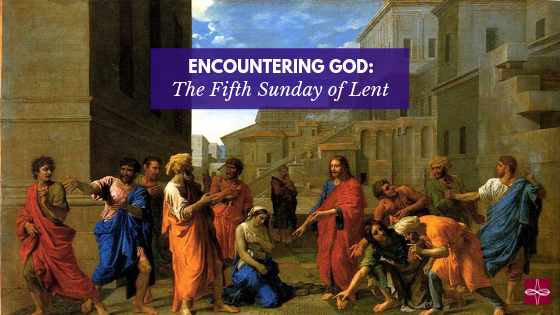
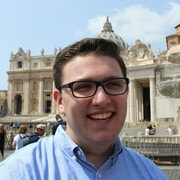
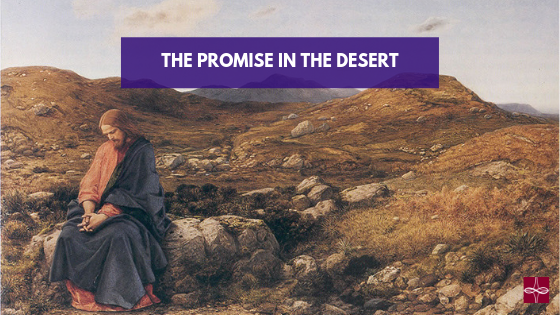

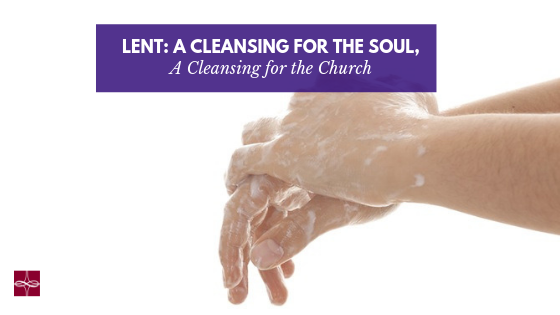

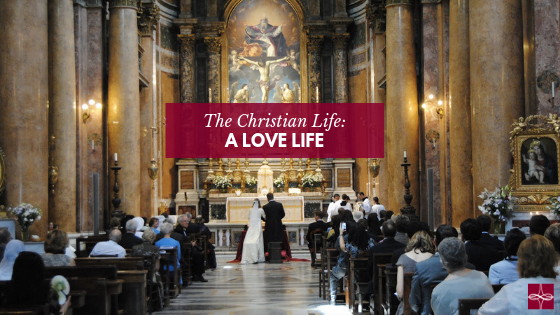



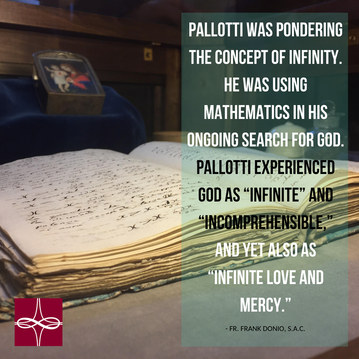
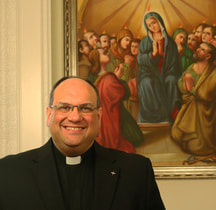
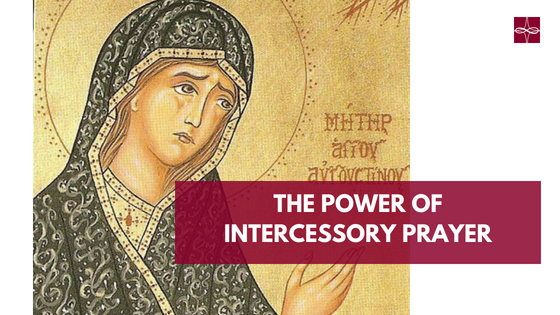



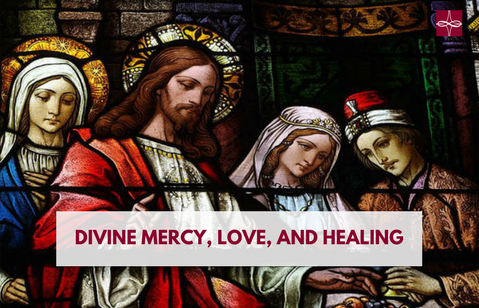





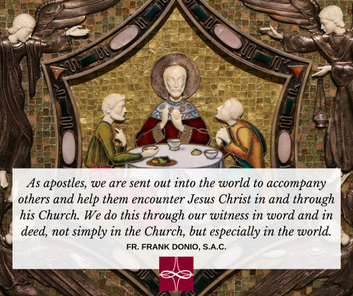
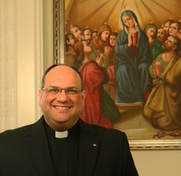
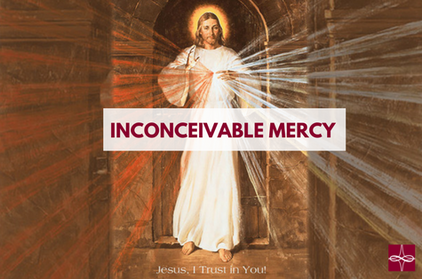

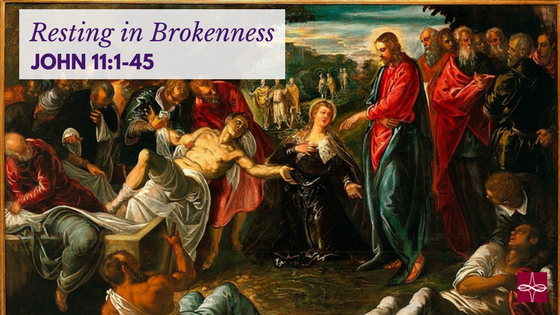
 RSS Feed
RSS Feed